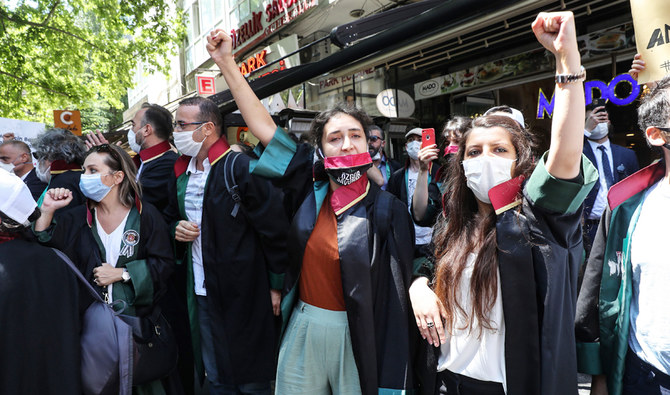ANKARA: Lawyers in Turkey stepped up their protests on Saturday after the Turkish parliament passed a controversial law that critics claim dilutes the power of bar associations.
International observers and legal experts have attacked the legislation, saying that it further restricts judicial independence.
Heads of Turkey’s bar associations who have protested in Tunali park in Ankara for several days — sleeping overnight on playground ramps and slides, with blankets provided by colleagues — vowed to continue their public opposition to the legislation.
The law has alarmed legal experts and members of the international community, including Human Rights Watch and the International Commission of Jurists, who fear that it will politicize the judiciary, limit lawyers’ independence and reduce bar associations’ ability to monitor human rights.
Representatives of 80 bar associations have opposed the plan, and staged nationwide marches and protests in Ankara.
Under the new law, in provinces with over 5,000 lawyers, a group of at least 2,000 lawyers can establish alternative bar associations. This allows for multiple bar associations in cities such as Istanbul, Ankara and Izmir, where the current bar associations are among the few remaining institutions in Turkey voicing public criticism.
Under the current system, they represent 55 percent of lawyers in Turkey.
The amendment will significantly reduce the nationwide representation of the largest bar associations within the Union of Turkish Bars (TBB), an umbrella body whose board features two delegates from each bar association.
However, with new changes, the number of delegates to sent to the TBB will be cut in favor of rival bar associations that will likely be formed through political affiliations.
Large bar associations will lose influence in decision-making and the election of the umbrella body’s president.
Experts say the move will weaken standards in the legal profession and prevent the the ability of bar associations to uphold human rights commitments in the country.
The CHP, Turkey’s main opposition party, will appeal to the Constitutional Court of Turkey for an annulment once the law is published. But even if the court annuls the legislation, bar associations will not be closed since the verdict of the court does not apply retroactively.
Lawyer Mehmet Koksal said that a public backlash against the new law is highly likely.
“Alternative bar associations will be only formed in Istanbul, Ankara and Izmir because of their high number of members. They are at the same time the ones who determine the general line of legal system in Turkey contrary to government expectations,” he told Arab News.
However, experts fear that the newly adopted legal changes will undermine the professional ethics and quality of lawyers, and polarize the profession.
“The lawyers will be put under governmental guidance and it will produce a chain effect, because the judges will refrain from giving favorable verdicts in cases where non-partisan bar associations are involved. It will seriously undermine the independence of the lawyers,” Koksal said.
The alternative bar associations will be able to give practicing certificates to attorneys, leading to a decentralized licensing system.
“It is unsurprising that the attorneys will give preference to those who have lower standards in awarding certificates. For the wrongdoings of the attorneys, the bar associations will refrain from opening investigations for fear that they may lose members and be closed,” Koksal added.
Human Rights Watch Turkey Director Emma Sinclair-Webb said the new law was passed without consultation with bar associations and was deliberately rushed through parliament.
“The aim is to be able to get rival government-friendly bar associations set up in Istanbul, Ankara and Izmir before the October bar elections, and to determine the result of the Dec. 2020 election of the head of the Union of Turkish Bar Associations,” she told Arab News.
“The presidency’s divide and rule project to politicize the institutions that represent the legal profession is another sad day for the rule of law in Turkey,” she added.





























